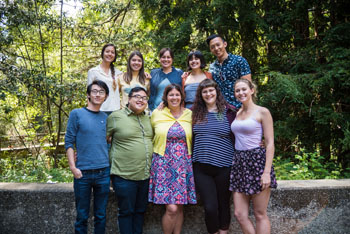Campus News
Summer Session becoming the hot way to get ahead
Summer Session is an educational boon for students, whether they are fulfilling their general education requirements or getting a jump on their college educations.

UC Santa Cruz’s popular Summer Session program was once the “best kept secret” on campus, a low-profile but sure-fire way for students to get a jump on their college educations or make sure they got the classes they needed. Now the secret is out—and thousands of students are taking advantage of this educational boon.
Summer Session—a series of intensive classes held during the summer break—is quickly becoming a popular option that helps students fulfill their major requirements and or even “fast track” their education, enabling them to graduate in only three years.
In other words, Summer Session is as far as you can get from that outdated stereotype of ‘summer school equals bummer school.’
Instead, “it’s a chance to get way ahead” says Monica Parikh, who oversees Summer Session for UC Santa Cruz. “It’s more flexible; students can complete classes in five weeks, still have time for work and vacation, or to study abroad while taking online classes.”
A modest sampling of the courses UC Santa Cruz offers every summer includes statistics, marine ecology, genetics, general and organic chemistry, calculus, computer programming, economics, natural history of the UCSC campus, introduction to film studies, screenwriting, preparatory musicianship, politics, and public speaking.
The campus prides itself on offering the classes current UC Santa Cruz students need to graduate; they are the priority. To that end, Summer Session is offering 250 classes this summer, including many specific classes that fill general education requirements. There are also online options—new initiative that has grown by leaps and bounds this year—and special classes offered by individual colleges.
Making the most of summer
However, offering needed classes for undergraduates is only one of the focuses of the multifaceted Summer Session. Motivated students can also use their summer as a means to “squeeze in a minor,” Parikh said.
Highly self-motivated incoming first-year and transfer students could opt to get a strong start on their education. Enrolling in Summer Session courses or the Summer Academy earns them credits even before they start in the fall, Parikh said.
Summer Academies — exclusively for new admits — will welcome over 200 students this July. Students will earn credits toward degree requirements, live in residence halls, and learn how to navigate campus life.
Summer Session has many courses geared to high school students who will be juniors or seniors in fall. They can earn UC credits over the summer and get a 50% tuition discount for each course. Not only that, but those credits are transferable to any UC campus or other university.
Summer Session now has high school students from the San Francisco and Monterey Bay areas. The program also draws students from California’s southlands, as well as the east coast and abroad.
Three-year pathways to success
Students have always had plenty of reasons to enroll in Summer Session, and now they have one more: a brand-new “three-year pathways’’ program instituted this year.
In fact, the program is so new at this point that the campus does not have records of anyone who has officially followed this fast-track pathway just yet, but the ultimate goal is to have 5 percent of students systemwide pursuing an accelerated three-year program by summer 2017, according to Stacey Sketo-Rosener, assistant vice provost for undergraduate advising at UC Santa Cruz.
So far, 12 departments have committed to designing their bachelor’s degree programs so students can finish their studies in three years instead of four, said Summer Session Director Parikh.
Those departments offering an accelerated pathways option—with help from Summer Session—include anthropology, art, business management and economics, environmental studies, film and digital media, history, legal studies, literature, politics, psychology, and sociology.
Those who are interested in this kind of fast tracking should be aware of a few stipulations. These “three-year pathways” work best for single-major students who decide not to change their major. Those who take this route are advised to fulfill their entry-level writing requirement by the end of their first term, and commit themselves to enrolling in Summer Session after their first and second years.
For many students, the attraction to the three-year pathway will be financial. By paying tuition, fees, and housing for fewer quarters, the cost of earning a degree can be less. And by graduating early to start graduate school or the career path, students can maximize their lifetime earnings. “Whether you take a class for your major, or to explore an interest, there is something special about summer at UCSC,” noted Parikh, “the small classes, the personal attention, students get a campus experience not found any other time of the year.”